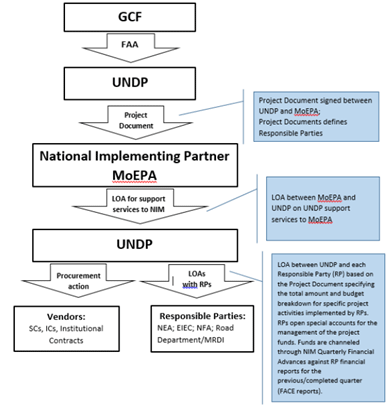Scaling-up Multi-Hazard Early Warning System and the Use of Climate Information in Georgia: FP068
Project Outline
This project seeks to achieve transformative change in climate risk reduction and management in Georgia through development of a fully-integrated impact-based Multi-hazard Early Warning System (MHEWS). In doing so, it will introduce standardized hazard, risk, and vulnerability assessments and mapping methods and technologies, and provide critical climate risk information to enable the implementation of nationwide risk reduction policies.
| Country(ies) | Georgia |
|---|---|
| National Designated Authority (NDA) | Deputy Minister of Environment and Natural Resources Protection |
| Accredited Entity (AE) | United Nations Development Programme: UNDP (International) |
| Executing Entity (EE) | Ministry of Environment Protection and Agriculture of Georgia: MoEPA (Public) |
| Date of Final FP Submission | February 5, 2018 |
| Estimated Project Duration | 2018-2025 |
| Target Sector | Risk Management (Climate) |
| GCF Financing | 27.054 million USD (Grant) Medium |
| Co-financing |
|
Project Description
< Major Project Components>
- Expansion of hydro-meteorological network, risk zoning, information systems.
- Implementation and enhanced use of early warning system and new climate information products.
- 3. Implementation and capacity building for community-based climate risk reduction management and interventions.

- National Environmental Agency (NEA)
- Environmental Information and Education Center (EIEC)
- National Food Agency (NFA)
Ref: FP068 Scaling-up Multi-Hazard Early Warning System and the Use of Climate Information in Georgia
Potential Indicators of Key Impacts
Expected total number of direct and indirect beneficiaries, disaggregated by gender (reduced vulnerability or increased resilience):
- Direct beneficiaries: 1,710,000 persons (52% of total beneficiaries will be female)
- Indirect beneficiaries: 3,710,000 persons (46% of the total population)
- Other relevant indicators:
- Protection of over 3,000 ha of agricultural land and 3,500 properties through structural flood protection measures for a total of $19.4 million, with two thirds benefitting property and one-third benefitting agricultural land.
- MHEWS established in all 11 major river basins-the entire territory of the country-and necessary institutional/regulatory frameworks for smooth and effective operations in place.
- Community-based early warning systems (EWSs) are established in 100 high-risk settlements.

